

Hébergement web sous GNU/Linux : quelles permissions pour les fichiers. La plupart des sites web nécessitent qu’une ou plusieurs personnes puissent intervenir pour modifier le contenu des fichiers et répertoires qui constituent le code du site web.
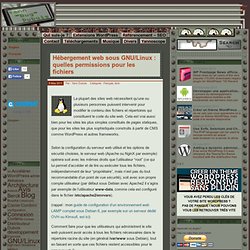
Cela est vrai aussi bien pour les sites les plus simples constitués de pages statiques, que pour les sites les plus sophistiqués construits à partir de CMS comme WordPress et autres frameworks. Selon la configuration du serveur web utilisé et les options de sécurité choisies, le serveur web (Apache ou NginX par exemple) opérera soit avec les mêmes droits que l’utilisateur “root” (ce qui lui permet d’accéder et de lire ou exécuter tous les fichiers, indépendamment de leur “propriétaire”, mais n’est pas du tout recommandable d’un point de vue sécurité), soit avec son propre compte utilisateur (par défaut sous Debian avec Apache2 il s’agira par exemple de l’utilisateur www-data, comme cela est configuré dans le fichier /etc/apache2/envvars).
Création de comptes d’utilisateurs personnels sudo adduser <login> …ou… ISPmail tutorial for Debian Squeeze. Url?sa=t&rct=j&q=&esrc=s&source=web&cd=1&ved=0CCgQFjAA&url=http%3A%2F%2Fchristian.caleca.free.fr%2Fpdf%2FInstaller%2520Qmail-v1. Installation de qmail sous debian. INSTALL. How to set up a qmail POP3 service. A qmail POP3 service handles incomming POP3 connections.
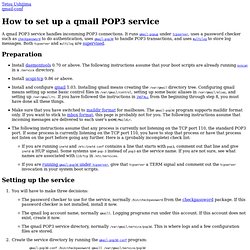
It runs qmail-popup under tcpserver, uses a password checker such as checkpassword to do authentication, uses qmail-pop3d to handle POP3 transactions, and uses multilog to store log messages. Both tcpserver and multilog are supervised. How to set up a qmail SMTP service. GNU Binutils. The GNU Binutils are a collection of binary tools.

The main ones are: ld - the GNU linker. as - the GNU assembler. But they also include: addr2line - Converts addresses into filenames and line numbers. ar - A utility for creating, modifying and extracting from archives. c++filt - Filter to demangle encoded C++ symbols. dlltool - Creates files for building and using DLLs. gold - A new, faster, ELF only linker, still in beta test. gprof - Displays profiling information. nlmconv - Converts object code into an NLM. nm - Lists symbols from object files. objcopy - Copys and translates object files. objdump - Displays information from object files. ranlib - Generates an index to the contents of an archive. readelf - Displays information from any ELF format object file. size - Lists the section sizes of an object or archive file. strings - Lists printable strings from files. strip - Discards symbols. windmc - A Windows compatible message compiler. windres - A compiler for Windows resource files.
Project Archives. Configurer un serveur dédié OVH/Kimsufi/Debian 5 pour LAMP. Je retranscris ici un petit memento que je me suis fait pour “remonter” rapidement une configuration opérationnelle sous Debian 5 / Apache2 / PHP5 / Mysql pour héberger des sites sur un serveur dédié GNU/Linux type OVH ou Kimsufi.
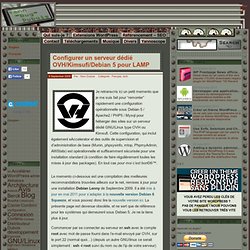
Cette configuration, qui inclut également eAccelerator et des outils de supervision et d’administration de base (Munin, phpsysinfo, mtop, PhpmyAdmin, AWStats) est opérationnelle et suffisamment sécurisée pour une installation standard (à condition de faire régulièrement toutes les mises à jour des packages). En tout cas pour moi c’est bon©®™. Le memento ci-dessous est une compilation des meilleures recommandations trouvées ailleurs sur le net, remises à jour pour une installation Debian Lenny de Septembre 2009. Il a été mis à jour en mai 2011 pour s’adapter à la nouvelle version Debian 6 Squeeze, et vous pouvez donc lire la nouvelle version ici. La présente page est devenue obsolète, et ne sert que de référence pour les systèmes qui demeurent sous Debian 5. Configurer un serveur web dédié OVH/Kimsufi sous Debian 6. En septembre 2009, j’avais écrit un tutoriel détaillé sur la configuration d’un serveur dédié OVH qui a remporté un grand succès.
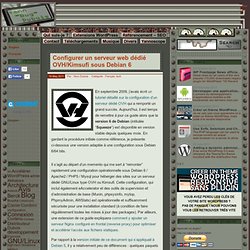
Forums.eukhost. Recompiling PHP5 With Bundled Support For GD On Ubuntu. I’ve been installing the LAMP stack on an Ubuntu based server for a client.
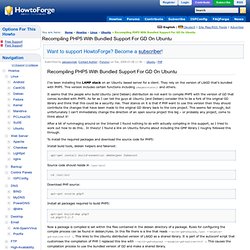
They rely on the version of LibGD that’s bundled with PHP5. This version includes certain functions including imagerotate() and others. It seems that the people who build Ubuntu (and Debian) distribution do not want to compile PHP5 with the version of GD that comes bundled with PHP5. As far as I can tell the guys at Ubuntu (and Debian) consider this to be a fork of the original GD library and think that this could be a security risk. Their stance on it is that if PHP want to use this version then they should contribute the changes that have been made to the original GD library back to the core project. After a bit of rummaging around on the Internet I found nothing to do with actually compiling in this support, so I tried to work out how to do this… In theory! To install the required packages and download the source code for PHP5: Install build tools, debian helpers and fakeroot: How to, install complete bundled GD libs on Debian / Ubuntu LAMP stack.
How to, install complete bundled GD libs on Debian / Ubuntu LAMP stack Following only applies to debian / ubuntu installations, and will install the complete bundled ( forked ) GD libraries.
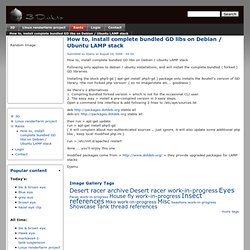
Installing the stock php5-gd ( apt-get install php5-gd ) package only installs the Boutell's version of GD library -the non forked php version- ( so no imagerotate etc... goodness ) So there's 2 alternatives 1. Compiling bundled forked version > which is not for the occasional CLI user. 2.